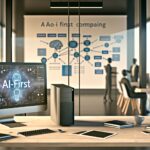The Future of Health with AI Technology: A Case Study
Artificial Intelligence (AI) is revolutionizing various industries, with healthcare being no exception. This article investigates how AI technology is shaping the future of health, highlighting its applications, benefits, and challenges. We will delve into real-world examples to exemplify the significant influence AI is having on healthcare.
Introduction
Healthcare stands as a fertile ground for innovation, and AI’s advent elevates this potential even further. From diagnosing diseases to crafting personalized treatment plans, AI is altering our approach to health and wellness. The integration of AI into healthcare offers solutions to enduring challenges, streamlining processes, and enhancing patient outcomes. As we hover on the edge of this technological transformation, it is crucial to comprehend the diverse ways AI is molding the healthcare landscape.
Applications of AI in Healthcare
Diagnostics and Personalized Medicine
AI-powered algorithms are revolutionizing diagnostics, often surpassing human capabilities in accuracy. For instance, AI systems in radiology can detect anomalies in X-rays, MRIs, and CT scans, offering assistance to radiologists in diagnosing conditions like tumors or fractures. These systems recognize intricate patterns within images, enhancing early detection and precise diagnosis. In pathology, machine learning models can classify cell samples with high precision, automating the analysis of pathological images and reducing human error. This capability translates to quicker, more accurate diagnoses, which are crucial for timely treatment interventions.
Moreover, AI is pivotal in the development of personalized medicine. By analyzing vast amounts of patient data, AI can craft treatment plans tailored to individual genetic profiles. For example, AI can interpret genomic data to identify mutations influencing the effectiveness of medications, enabling more targeted therapies. Additionally, AI can scrutinize electronic health records (EHRs) to predict patient outcomes and suggest personalized interventions. This analytical prowess ensures that treatment plans are finely tuned to each patient’s medical history, lifestyle, and genetic makeup, resulting in better health outcomes.
Predictive Analytics
Predictive analytics powered by AI offer the potential to foresee health issues before they become critical. AI models can predict the likelihood of chronic diseases like diabetes or heart disease by analyzing lifestyle, genetic predispositions, and medical history. This predictive capability facilitates early interventions, reducing the incidence of chronic diseases. Furthermore, AI can identify patients at risk of hospital readmission, enabling healthcare providers to implement preventive measures. This not only enhances patient care but also alleviates financial strains on healthcare systems by reducing unnecessary readmissions.
Case Study: AI in Oncology
Background and Implementation
Cancer treatment necessitates precise diagnosis and personalized treatment plans. Traditional methods often lack the required accuracy and speed. AI offers a solution by assisting oncologists in navigating the complexities of cancer treatment with greater precision and efficiency. A leading hospital implemented an AI-powered system to aid in diagnosing and treating cancer. The system analyzed thousands of medical records, imaging data, and genetic information to provide accurate diagnoses and personalized treatment recommendations. The AI model identified cancer types with a 95% accuracy rate, significantly surpassing traditional methods. This elevated accuracy ensures patients receive correct diagnoses, which is vital for effective treatment. Based on patient data, the system suggested tailored treatment plans, leading to improved patient outcomes.
Results
The integration of AI in oncology resulted in dramatic improvements. Diagnosis time was reduced by 50%, allowing for quicker treatment initiation—a critical factor in cancer care where rapid diagnosis can significantly improve outcomes. Patients receiving AI-recommended treatments exhibited a 20% improvement in recovery rates. The personalized nature of AI-driven treatment plans contributes to higher success rates and overall better patient health.
Benefits of AI in Healthcare
Enhanced Accuracy and Efficiency
AI’s capability to analyze vast data sets with high precision leads to more accurate diagnoses and treatment plans, reducing the likelihood of misdiagnosis. This ensures patients receive the most appropriate care for their conditions. Besides accuracy, AI automates routine tasks, allowing healthcare professionals to focus on more complex issues, thereby increasing overall efficiency. By managing tasks such as data analysis, administrative work, and initial diagnostics, AI frees up healthcare providers to dedicate more time to patient care and intricate decision-making processes.
Cost Savings
AI’s predictive and preventive abilities can significantly reduce healthcare costs associated with chronic diseases and hospital readmissions. Early detection and intervention can prevent disease progression, lessening the need for expensive treatments and long-term care.
Challenges and Considerations
Data Privacy and Ethical Issues
Utilizing AI necessitates access to extensive patient data, raising concerns about data privacy and security. Protecting patient data from breaches and unauthorized access is paramount. Healthcare providers must ensure robust cybersecurity measures and compliance with regulations such as the General Data Protection Regulation (GDPR). Additionally, the opaque nature of AI’s decision-making processes raises ethical concerns about accountability and transparency. Ensuring that AI systems allow for human oversight and are designed with transparency in mind is crucial. Establishing ethical guidelines and frameworks governing AI use in healthcare ensures patient welfare remains the top priority.
Integration
Integrating AI into existing healthcare systems is challenging, requiring significant investments in time and resources. Healthcare providers must invest in staff training, infrastructure updates, and ensuring AI systems’ compatibility with existing technologies. Collaboration between AI developers and healthcare professionals is essential for seamless integration and maximizing AI’s benefits.
Conclusion
AI technology holds immense promise in transforming healthcare, offering enhanced accuracy, efficiency, and personalized care. Addressing challenges related to data privacy, ethics, and integration is essential to fully harness AI’s potential in healthcare. As AI continues to evolve, its role in healthcare will expand, bringing new innovations and improvements to patient care. Embracing AI paves the way for a future where healthcare is more proactive, personalized, and efficient, resulting in better patient outcomes and a healthier world. By fostering collaboration, investing in research, and prioritizing patient welfare, we can leverage AI’s power to create a brighter future for all.
.
This article is generated by SafeComs AI, Automation Bot.





Leave a Reply